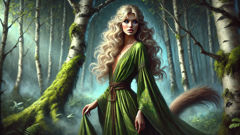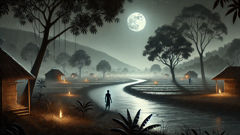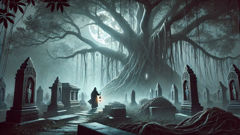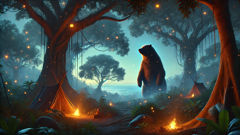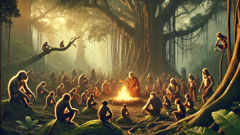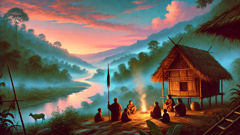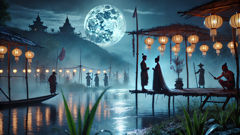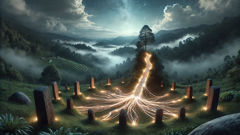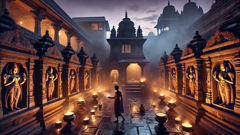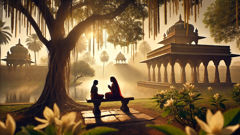Introduction
Deep in the heart of Norway, where ancient forests whisper secrets through pine and birch, legends coil like mist above the mossy earth. For centuries, villagers living at the forest’s edge have shared stories of the Huldra—a spirit as beautiful as she is deadly. She is said to glide among the trees with hair spun from sunlight and eyes the blue of a summer fjord, her laughter echoing like wind over still water. Yet, for all her beauty, there is one secret she cannot hide: a cow’s tail swaying behind her, a symbol of her wild and untamed nature. Travelers and woodcutters know to watch for her in the twilight, when shadows deepen and every tree trunk seems to breathe. Some claim she brings fortune to those who treat her kindly; others whisper that those who fall under her spell are never seen again, drawn forever into the mountain’s stony embrace. This is a story of temptation and danger, of the wild power that stirs beneath Norway’s green canopy. It is the tale of a man named Eirik, whose fate became entwined with the Huldra’s, and whose journey reveals not only the perils of longing but the haunting beauty of the wilderness itself.
Whispers Among the Pines
The story begins in the village of Skogheim, nestled between dense forests and jagged mountains, where life moved to the slow rhythm of the seasons. Eirik, a woodcutter’s son, grew up with tales of the Huldra humming at the edge of every firelit night. His father spoke of her with a cautious reverence, while his mother would cross herself and scatter salt at the door when dusk fell. Still, curiosity tugged at Eirik’s heart more fiercely than fear. The forest called to him—the hush of the undergrowth, the scent of pine sap and damp earth, and, sometimes, laughter that seemed to flit between the branches just beyond his sight.
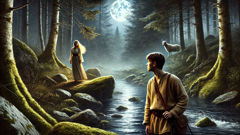
On a silvery June evening, Eirik made his way deeper into the woods than he ever had before, searching for a fallen ash his father wanted for firewood. The sun dipped low, gilding everything with a pale, haunting light, and the shadows beneath the trees seemed to stretch and sigh. The stillness was broken by a song—a melody so pure and sweet that it seemed impossible a human throat could form it. Drawn as if by magic, Eirik followed the sound, heart pounding in his chest.
He found her beside a crystal stream: a woman more beautiful than he’d ever dreamed, her hair flowing long and loose, her eyes catching the last of the light. Her dress shimmered green and gold, blending with the moss and ferns. And there, half-hidden behind her, was the unmistakable swish of a cow’s tail. For a heartbeat, fear rooted Eirik to the spot, but her smile was gentle, her gaze soft. The Huldra beckoned him closer.
"Why do you hide in the woods?" Eirik asked, his voice trembling between awe and terror. She laughed—a sound like wind in the birches—and replied, "Because this is where I belong. Do you not feel it, Eirik? The wildness in your blood, the longing for something beyond the village walls?"
He nodded, unable to speak. Her hand touched his cheek, cold as dew yet tinged with warmth. "You are not like the others. Will you walk with me awhile?" Eirik found himself agreeing before he truly understood what she meant. The forest seemed to close around them, trees bending closer, shadows deepening. He forgot the ash tree, his father’s axe, the distant smoke rising from Skogheim’s chimneys. All that remained was the Huldra and the path she set before him.
They wandered under ancient trees, their roots twisting like sleeping serpents. The Huldra showed him springs hidden beneath mossy stones and clearings where wildflowers grew so thick it looked as if the stars had fallen to earth. As dusk deepened to night, Eirik realized he had no idea where he was—nor did he care. The air shimmered with the hum of unseen insects, and above them, the first stars blinked awake.
But as the moon rose, something changed. The Huldra’s eyes grew darker, her laughter colder. "Most who follow me never return," she whispered, voice like a knife through velvet. Eirik’s heart stuttered. He glanced back, but the path was gone. The trees crowded close, unfamiliar and watchful. "Why do you bring me here?" he asked, fear finally outweighing enchantment.
"You came because you wished for wonder," the Huldra replied, her tail curling around her like a cat’s. "But wonder always has its price. Will you pay it, Eirik? Will you leave behind the world you knew?"
He hesitated. In that moment, the spell broke just enough for him to remember his family—the warmth of his mother’s embrace, his father’s gruff laughter. He shook his head. "I can’t. I belong to them, as much as I long for something more."
For a moment, sorrow flickered in the Huldra’s eyes. She touched his brow, and the forest fell away. Eirik found himself alone by the stream, the melody fading like a dream on waking. The only proof of the night’s enchantment was a single strand of golden hair tangled in his fingers, and the echo of laughter in the wind.
The Bargain Beneath the Mountain
The weeks that followed were restless for Eirik. By day he helped his father fell trees and stack firewood, but his thoughts drifted ceaselessly to the Huldra. Each night he dreamed of green shadows and starlit glades, of laughter that promised both joy and danger. The villagers noticed the change in him—how he moved with a distracted air, how he seemed to listen for something beyond the ordinary sounds of daily life.
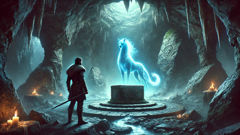
One dusk, unable to resist the longing any longer, Eirik returned to the woods. The same song led him, now tinged with melancholy. The Huldra waited beneath a silver birch, her face half-hidden in shadow. "You came back," she said, her voice softer than before. "Few do."
"I couldn’t stay away," Eirik admitted. "But I can’t leave my family behind."
The Huldra’s eyes glimmered with something ancient and sorrowful. "We spirits are bound by our nature, just as you are bound by yours. But there are bargains that can be made. Some say that if a human marries a Huldra in a church, she becomes mortal, her tail vanishes, and she can live among people. Others say such unions end in tragedy. What do you believe, Eirik?"
He looked at her—not just the beauty that dazzled him, but the wildness that set her apart. "I believe love can change even the oldest magic," he said. It was a truth both naive and profound.
They met in secret as summer ripened. Eirik brought her gifts—wildflowers, a silver comb from his mother’s chest, honeycomb stolen from a hollow log. She showed him wonders of the forest: an elk’s antler caught in a thicket, a fox den nestled beneath a fallen tree, a circle of stones where mushrooms grew in fairy rings.
But as autumn crept in, the forest changed. The wind grew colder, leaves burned red and gold before falling. The Huldra’s laughter grew rare; her eyes were often sad. One evening, she told Eirik that her time was running short. "The mountain calls me home," she whispered. "If you would save me, you must come. But you must bring faith and courage—nothing else will serve you."
Eirik agreed without hesitation, though his heart quailed at the unknown. The next night, he crept from his family’s cottage and followed the Huldra’s song into the foothills. Mist curled around his feet, and the mountain loomed above, dark and forbidding. The Huldra stood at the mouth of a cave, her dress shimmering with dew. "Are you sure?" she asked. "Once you enter, there is no turning back."
He nodded, and together they passed into darkness. The cave was cold and damp, the walls alive with lichen and trickling water. At its heart was a chamber lit by strange, flickering lights—will-o’-the-wisps that danced above stone altars. Here, the Huldra revealed her true form: her hair glowed brighter, her eyes shone with an inner fire, and her tail lashed with agitation.
"This is where I was born," she said. "And where I must remain unless someone loves me enough to free me. But to do so, you must face three trials: one of courage, one of compassion, and one of truth."
Eirik steeled himself. The first trial was a chasm spanned by a single slippery log. Below yawned a darkness alive with whispers. He crossed it, heart hammering, never looking down. The second trial was a wounded lynx, snarling in pain. Remembering the Huldra’s lessons, he soothed it with gentle words and bound its wound with his shirt.
The final trial was a mirror, ancient and clouded. When Eirik peered into it, he saw himself—not as he wished to be, but as he was: flawed, afraid, yet fiercely loyal. "Are you worthy?" the mirror seemed to ask.
He answered simply, "I am only human. But I will do my best."
The lights brightened. The Huldra wept—tears like dewdrops on stone. "You have freed me, Eirik. But now comes the hardest part: you must choose. Stay with me in the wild forever, or return to your world and remember me only in dreams."
Torn between love and duty, Eirik hesitated. But at last he chose home, knowing that the forest would always hold part of his heart.
Echoes in the Green Shadows
Eirik returned to Skogheim changed by his trials—older in spirit, touched by magic’s bittersweet grace. The villagers remarked on his quietness, his tendency to gaze toward the forest at dusk as if waiting for something—or someone. He resumed his work in the woods but moved with a newfound reverence, always leaving gifts of bread or honey for the unseen spirits he now knew to be real.
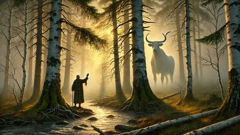
Seasons passed. Eirik married a village girl with laughing eyes and hair the color of ripe barley. They built a home together at the forest’s edge, where their children grew up with stories of the Huldra and her wild kin. But sometimes, when twilight painted the trees silver and green, Eirik would wander alone among the pines, listening for distant laughter.
On one such evening, as the air shimmered with spring’s promise, he found himself drawn to the old stream where he’d first seen the Huldra. Mist curled low over the water; the song of birds faded into silence. There, reflected in the rippling surface, he glimpsed a golden-haired woman moving between the trees—her cow’s tail barely visible beneath a gown of moss and fern.
She did not approach but watched from afar, her eyes bright with sorrow and understanding. Eirik raised his hand in silent greeting. For a heartbeat, he felt her presence—a blessing and a farewell intertwined. He realized then that the Huldra would always be part of him: not as a lover lost but as a reminder of all that is wild and wondrous in the world.
Years melted into decades. Eirik’s children grew strong; his hair turned silver. Yet the legend of the Huldra endured—passed from parent to child in stories by the hearth, in songs sung beneath the stars. Some villagers dismissed her as superstition; others left offerings at hollow trees or paused respectfully when a fox darted across their path. But for Eirik and those who truly listened, the forest was never empty.
One winter’s night, as snow fell thick and silent, Eirik slipped quietly from his bed. Guided by memories and moonlight, he walked into the woods for the last time. They found him at dawn by the stream, a faint smile on his lips, his fingers clutching a single strand of golden hair. No footprints led away—only the hush of the trees and the lingering scent of wildflowers beneath the snow.
The villagers mourned him with songs and stories, their words threading together old fears and new wonder. Some claimed they saw a beautiful woman with a cow’s tail standing at the edge of the woods that night, watching over Eirik as he crossed into the next world. Others said his spirit now wandered with hers, forever part of the shadowed green where stories live on long after memory fades.
And so, in Skogheim and far beyond, the legend of the Huldra endures: a reminder of the beauty and peril that lie just beyond the known path, and of the love that can shape even the oldest magic.
Conclusion
The legend of the Huldra lingers in Norway’s forests, as alive as the rustle of wind through pine needles or the shimmer of moonlight on moss. Some say she is a cautionary tale—a warning against wandering too far from home or succumbing to desires that lead beyond safe paths. Others see her as a symbol of nature’s wild grace, a reminder that beauty can be both a gift and a danger. For Eirik and those who remember his story, the Huldra represents more: she is the spirit of longing itself—the yearning for what lies just out of reach, for wonder tangled in shadows and laughter echoing through green halls. Even now, when the sun dips low and mist gathers among the trees, travelers pause at the edge of the wild. They listen for music that drifts like smoke on the evening air, or catch a glimpse of golden hair weaving through the ferns. If you ever find yourself in Norway’s ancient woods, walk with respect—and remember that every legend holds a seed of truth, hidden like a wildflower beneath the leaves.

